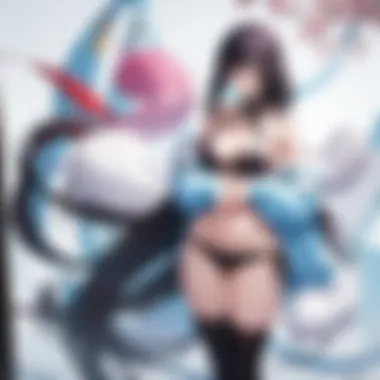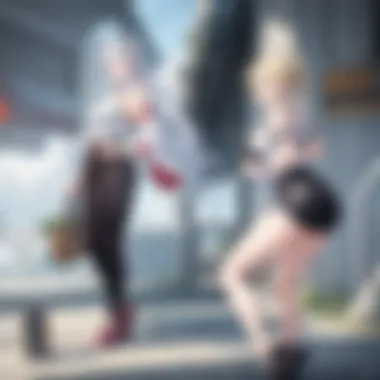Exploring Weight Loss Themes in Anime Culture


Intro
The portrayal of weight loss and body image in anime often reflects larger societal views on health, fitness, and personal achievement. This exploration elucidates how different narratives unfold around characters. These narratives can provide insight into the emotional and psychological journey associated with weight loss. Not only are they entertaining, but they also resonate with viewers at a personal level.
By analyzing specific characters and their development arcs, we can gain a clearer understanding of how weight loss is represented in various settings. Some anime approach these themes with humor, while others tackle them more seriously. This article delves into these narratives, revealing the multifaceted nature of such themes in anime culture.
Character Profiles
Overview of Main Characters
Anime features a multitude of characters that undergo significant physical transformations. One particularly notable character is Shizuku Tokumine from "Cinderella Approaches". Her transformative journey not only alters her appearance, but also enhances her self-confidence and social interactions. Another significant example is Izuku Midoriya from "My Hero Academia", whose physical strength develops alongside his emotional fortitude, reflecting a deeper message about resilience and determination.
Supporting Characters
Supporting characters also provide essential perspectives on weight loss themes. Characters such as Megumi Fushiguro in "Jujutsu Kaisen" illustrate how societal pressures can influence body image and self-esteem. Through interactions with protagonists, these characters highlight the different sensibilities surrounding weight and fitness.
Theme Exploration
Central Themes
Central themes regarding body image in anime often revolve around self-acceptance, societal pressure, and personal growth. The contrast between a character's physical appearance and their inner self can create powerful narratives. Anime frequently explores body image struggles, particularly during adolescence, making these themes relatable for many viewers.
Cultural References
Cultural references often enhance the themes explored in anime. For example, the concept of kawaii culture in Japan emphasizes cute and youthful appearances, which can contribute to body image issues. Thus, understanding these cultural undercurrents can deepen one's appreciation of how weight loss narratives are crafted within anime settings.
Popular Series and Recommendations
Top Anime Series of the Year
In recognizing contemporary series that illustrate weight loss themes, Aotearoa Life and Transformation stand out. Both series offer captivating narratives that explore the complexities of weight management and emotional health while delivering actionable insights for viewers.
Hidden Gems in Manga
Some lesser-known but impactful manga worth exploring include "Weight of the World" and "Steps to Self-Love". These stories provide unique perspectives on body image and personal journeys, often addressing the subtler aspects of weight loss and identity.
Intro to Weight Loss in Anime
The topic of weight loss in anime serves not only as a fundamental aspect of character development but also highlights societal attitudes toward body image and health. Weight loss is often portrayed in a nuanced manner, reflecting deeper narratives that resonate with viewers on multiple levels. Examining these themes allows us to understand how anime reflects and sometimes challenges contemporary societal norms.
Weight loss, within the framework of various anime narratives, provides insight into character motivations, emotional struggles, and ultimately, growth. Characters embarking on weight loss journeys often symbolize more than just physical transformation; they can encapsulate themes of perseverance, identity, and personal growth, making their stories relatable to audiences.
Understanding Weight Loss as a Narrative Device
In the realm of storytelling, weight loss is more than a physical change. It delineates a journey filled with challenges and achievements. Characters that undergo this transformation often do so alongside significant life events or conflicts that test their resolve. For instance, an anime might feature a protagonist who battles personal insecurities, and through their pursuit of a healthier lifestyle, they learn about self-acceptance and resilience. Often, this journey is portrayed with unexpected depth, highlighting emotional struggles that can resonate with viewers who have faced similar issues.
Moreover, the concept of transformation is frequently tied to shonen narratives, where physical prowess is often tied to identity. Characters evolve into stronger versions of themselves through their quests for fitness and health, underscoring the link between physical change and perceived self-worth. In this context, weight loss becomes a compelling narrative device that serves to reinforce core themes of empowerment and determination.
Cultural Influences on Body Image in Anime


The portrayal of body image in anime is heavily influenced by cultural standards and traditions. In Japan, societal pressures about appearance and physique can shape how characters are written and perceived. This cultural backdrop creates a fertile ground for examining issues surrounding weight and self-identity.
Anime often reflects these norms while sometimes critiquing them. Characters might be depicted in stark contrast to societal ideals, highlighting the journey toward self-acceptance and the complexities of body image. Some series may tackle these issues head-on, presenting characters with realistic struggles against societal expectations, while others may take a lighter, more comedic approach to similar themes.
The interplay between character narratives and cultural body image ideals provides rich material for analysis. Characters who deviate from the norm may question these ideals, prompting discussions on the importance of mental health along with physical fitness. Thus, we see how weight loss narratives in anime are not just about losing weight but are intertwined with broader discussions about health, image, and identity.
Popular Anime Featuring Weight Loss Themes
The exploration of weight loss themes within anime presents a fascinating intersection between storytelling and cultural values. Anime often reflects societal expectations around body image and personal transformation. Here, characters undertake journeys that are as much about physical change as they are about emotional and psychological development. This section delves deeper into notable anime series where weight loss plays a significant role. Understanding how these narratives are constructed can shed light on common tropes and character arcs, enhancing our appreciation of the medium.
The Role of Transformation in Shonen Anime
Shonen anime often emphasizes themes of growth and improvement. Transformation is a central motif in these stories, whether it be through physical training, competitions, or intense challenges. The narrative arc generally follows young males striving to surpass their limits.
In series like Naruto and My Hero Academia, weight loss serves as a physical manifestation of a character's struggles and triumphs. Characters often face adversities that lead to significant transformations in both body and spirit. The act of losing weight can symbolize overcoming personal demons or societal pressures.
- Character Motivation: Weight loss can reflect a character’s desire to gain strength or confidence.
- Visual Metaphor: The change in physique often coincides with a change in attitude or skill level.
- Audience Connection: Viewers relate to the physical struggles depicted, making the journeys more impactful.
Slice of Life Series Addressing Health and Fitness
In contrast to the high-energy battles of shonen anime, slice of life series offer a more grounded exploration of weight loss themes. These shows often tackle everyday issues related to health, fitness, and body image. Komi Can't Communicate and Wotakoi: Love is Hard for Otaku present characters dealing with realistic weight loss journeys in more subtle and relatable ways.
Through character interactions and daily life struggles, the narrative sheds light on:
- Self-Acceptance: Characters confront their body image and societal ideals.
- Realistic Approaches: Emphasizing the importance of moderate lifestyle choices and mental well-being rather than extreme transformations.
- Friendship Dynamics: Relationships evolve as characters navigate personal challenges together. This can foster a sense of community around healthy living.
Isekai and Fantasy: An Unconventional Perspective
Isekai, or alternate world anime, often showcases a unique take on weight loss themes. Rather than focusing strictly on physical bodies, these narratives can present weight loss as a metaphor for rebirth or transformation. Series like Re:Zero and Sword Art Online feature characters who often gain or lose physical weight as part of their broader character development in fantastical settings.
This perspective introduces several interesting elements:
- Imposing Environments: Characters face challenges that often compel them to adapt physically and mentally in their new worlds.
- Contrast to Real World: The exaggeration of traits (such as strength or agility) facilitates discussions about the unrealistic standards often set by society.
- Identity Exploration: The loss or change of physical form can symbolize deeper themes of personal identity and self-worth, reflecting broader cultural anxieties.
Weight loss representation in anime encompasses various narrative devices that engage audiences at multiple levels. The diversity in portrayal also denotes how cultural attitudes shape our understanding of body image.
Understanding these distinctive themes enhances not just the viewing experience but also encourages reflection on the implications of weight loss narratives within the culture of anime.
Character Development and Weight Loss Journeys
Weight loss themes in anime often serve as a profound narrative device, facilitating character evolution across various story arcs. The process of shedding pounds can symbolize more than just physical transformation; it embodies changes in self-esteem, determination, and personal growth. Weight loss journeys allow characters to confront their insecurities while also fostering resilience. This journey can manifest in different forms, be it physical, emotional, or psychological.
Character development, intertwined with weight loss narratives, offers a relatable touchpoint for viewers. As characters encounter obstacles during their weight loss efforts, audiences witness setbacks and triumphs that resonate on a personal level. This can cultivate empathy and reflection among viewers, who may themselves be navigating similar issues.
Additionally, these journeys often prompt broader discussions about health and fitness. They challenge stereotypical representations of body image, encouraging a more nuanced understanding of the subject. Characters who take an active role in their weight loss can inspire audiences to appreciate the importance of a healthy lifestyle, rather than merely focusing on aesthetics.
With these considerations in mind, the narrative surrounding weight loss journeys in anime is not simply about changing bodies. It is fundamentally about evolving identities, social commentaries on body perception, and, ultimately, the value of perseverance.
Heroes on a Weight Loss Journey
Protagonists frequently embody the journey of weight loss within anime, serving as vessels for viewers to understand the challenges and rewards of such relatable arcs. Characters like Kōtamaki from KonoSuba or Armored Titan Eren from Attack on Titan demonstrate distinct approaches to their transformations. Their motivations vary from personal health aspirations to societal pressures, thus providing diverse perspectives. As they battle the scale, these heroes often face symbolic demons that mirror their internal struggles.


The narrative typically reflects a long term commitment, illustrating attempts, failures, and renewals of dedication. This captures not just the physical act of losing weight but the mental fortitude required in such pursuits.
Moreover, these heroes often undergo a significant transformation that extends beyond physical appearance. They evolve in self-confidence and social interaction. Their journeys articulate the importance of self-acceptance, illustrating that value lies not just in numbers but in resilience and mindset. As audience members become invested in their journeys, they often find encouragement to face their own challenges.
Supporting Characters and Their Roles
Supporting characters in anime that focus on weight loss can significantly contribute to the main character's journey. They may offer motivation, encouragement, or present challenges that further develop the protagonist's arc. For instance, friends or family members can serve as sources of inspiration or reminders of societal expectations regarding body image.
In some series, these secondary roles can also provide critical perspective shifts that challenge the protagonists. Characters like Tanjiro from Demon Slayer not only face their own battles but serve as moral compasses for their companions. Their presence can lead to essential discussions about body image and health, highlighting themes of acceptance and perseverance without resorting to harmful stereotypes.
Additionally, supporting characters can elucidate the broader societal pressures on body image. Their portraits might reflect a spectrum of experiences, showing both struggles with diet culture and advocacy for self-love. This rich tapestry provides a more comprehensive narrative landscape that embraces the reality of differing experiences in weight loss and motivations behind it.
Antagonists and Their Body Image Issues
Interestingly, antagonists in anime often showcase body image issues that further deepen the narrative complexity. Instead of conventional evil, these characters manifest insecurities tied to their bodies, fueling their antagonistic behavior. An example could be found in the portrayal of characters in My Hero Academia, where some villains project insecurities through aggression and adversarial roles.
These portrayals unearth the darker side of body perception. By presenting antagonists who grapple with their self-worth, the narratives can engage in discussions about the real consequences of societal expectations and pressure. They can serve as cautionary tales, illustrating that unchecked body image issues not only harm individuals but can also lead to destructive behavior.
In this regard, weight loss themes in these characters offer profound insights into the psychological struggles intertwined with self-image. Highlighting their failures and eventual resolutions may lead viewers to reconsider their views on body image complexity and the various forms that body-related struggles can take.
"Weight loss journeys in anime illustrate how physical transformations can signify deeper personal growth, emotional resilience, and the pursuit of self-acceptance."
Through the exploration of heroes, supporting characters, and antagonists within this context, the narrative unfolds a detailed map of weight loss journeys in anime. It stands as a representation of societal dynamics, offering a canvas for exploration into the often painful realities of body image and self-perception.
Humor and Seriousness in Portrayals of Weight Loss
Understanding the dual aspects of humor and seriousness in anime is crucial when examining how weight loss themes are portrayed. Anime often uses humor to make the struggles associated with weight loss relatable, yet it can also delve into serious issues. The balance between these two approaches shapes viewer perceptions and the discourse surrounding body image.
Balancing Comedy with Serious Themes
In anime, comedic elements serve as a tool to lighten the often harsh realities of weight loss. For example, series like KonoSuba or One Piece include weight loss moments that are exaggerated for comic effect, making them enjoyable without dismissing the issue. The humor here can make viewers more comfortable discussing body image topics.
However, it is essential that this comedic approach does not trivialize the challenges faced by characters. Characters in series like Hajime no Ippo exemplify this balance by showcasing both the humor in their training failures and the real struggles of their weight management. This multi-faceted portrayal offers a more nuanced understanding of weight issues, helping audiences to engage without feeling overwhelmed by negativity.
Tackling Body Image Issues with Sensitivity
The representation of body image in anime requires a careful touch. Discovering ways to discuss weight loss without fostering negative body image perceptions is a primary concern. Shows that address issues like bullying or self-worth, such as My Hero Academia, find ways to intertwine these serious topics while maintaining a level of humor. This nuanced approach encourages viewers to reflect on body image, potentially aiding in transforming negative thoughts about their bodies.
Moreover, the sensitivity in addressing these issues can significantly impact audience reception. When characters experience struggles with body image, their journeys can inspire viewers facing similar challenges. This connection creates a dialogue about personal acceptance and health, thus contributing positively to the broader societal views on body image.
"Anime has a unique ability to blend humor with deeper themes, making it a powerful platform for discussions about weight loss and body image."
Viewer Reactions and Cultural Impact
Understanding how audiences respond to weight loss themes in anime is essential to contextualize these narratives within the broader cultural landscape. This section highlights not only the emotional and psychological effects on viewers but also how these themes might influence societal perceptions of body image and health.
Audience Perception of Weight Loss Themes
The reception of weight loss themes varies widely among viewers. Different demographics assess the portrayal of characters and their journeys in largely unique ways. Some fans appreciate the realism and relatability of characters who struggle with weight loss. This mirrors their battles with self-image and lifestyle choices.
Conversely, others might perceive these portrayals as reinforcement of harmful stereotypes about body image. Viewers critique the tendency of some narratives to oversimplify the complexity of weight loss.


For instance, in popular series like Attack on Titan or My Hero Academia, character transformations often serve as a physical metaphor for growth and resilience. However, not all viewers resonate with this representation. They might argue that true experiences of body transformation are much more nuanced. Awareness of these contrasting perceptions is important for creators as they navigate sensitive themes.
Another factor influencing audience perception is cultural background. In cultures where Western ideals often dominate the conversation around weight and beauty, anime's portrayal of characters undergoing weight loss might appear refreshing or, at times, problematic. This creates a rich dialogue among fans where the interpretations challenge traditional norms surrounding body image.
Influence on Body Image and Self-Perception
Anime's representation of weight loss can deeply impact viewers' self-images and body perceptions. Many fans connect with characters facing similar struggles, which might foster a sense of solidarity. This connection can be positive, as it encourages viewers to embrace their own journeys towards better health.
However, there are also risks. Weight loss narratives can inadvertently perpetuate the idea that one's worth is tied to body size or shape. For example, characters in shows like Doraemon or Naruto, who face body shaming or adverse reactions due to their appearance, may resonate with viewers who face similar societal pressures. This leads to a complex relationship with self-worth, as the stakes surrounding body image in anime often reflect those in real life.
"The shift of focus towards the individual’s journey resonates much more with me than any standard portrayal. It's as though the evolution of the character assists in my own self-reflection."
Prominent discussions around these topics have emerged in online communities, such as Reddit. Fans express how their self-perception evolves with exposure to characters who embody perseverance, thus indicating that anime can significantly shape personal narratives surrounding body image—even for those who initially feel disconnected from the themes.
By examining viewer reactions and the cultural impact of weight loss themes, this article aims to illustrate the nuanced relationship Japanese media has with body image and the varied responses from a global audience. This understanding is crucial in exploring the weight loss dialogues within anime, as they contribute to wider discussions on health, fitness, and societal ideals.
Future Directions in Anime and Body Image Representation
The discussion around body image and representation in anime is continually evolving. This section aims to highlight the significance of addressing how anime reflects and shapes perceptions of health and fitness. These themes not only impact how characters are developed but also influence audience perceptions in a substantial way. As anime reflects contemporary societal changes, it becomes vital to explore these narratives going forward.
Evolving Narratives Around Health and Fitness
Recent years have shown an increasing willingness in anime to tackle nuanced portrayals of health and fitness. Instead of adhering strictly to traditional narrative formats, creators are beginning to depict characters who confront their body images and health choices with authenticity and complexity. This shift encourages viewers to engage with content that moves beyond superficial aesthetics.
- An example of this shift can be found in Shokugeki no Soma, where cooking becomes a means of exploring nutritional choices and health awareness, rather than just a competitive sport.
- Many shows now incorporate discussions about exercise and dietary choices, presenting them as integral to character growth. Characters don’t merely lose weight or gain muscle, but rather they learn about moderation and self-acceptance.
This evolution holds profound implications for viewers. By showcasing diverse paths to health, anime can serve as a source of inspiration and guidance, allowing audiences to reflect on their own wellness journeys.
Inclusiveness in Character Designs and Stories
Character design in anime plays a significant role in conveying themes of body image. Inclusivity in character designs offers representation for a broad spectrum of body types and health journeys. This trend not only fosters recognition but also nurtures acceptance among viewers of different backgrounds.
- A primary illustration of this trend is seen in Bunny Girl Senpai, where diverse characters possess varied body types and face unique struggles concerning self-image. The designs are not idealized but relatable, making the characters more approachable.
- Inclusivity also means telling stories from multiple viewpoints. Characters who face weight issues, eating disorders, or health challenges can provide relatable narratives that resonate deeply with viewers.
The implications of such inclusiveness are profound. By highlighting the multitude of experiences related to body image and health, anime can demystify and normalize topics that are often stigmatized. As a result, viewers can develop a more empathetic understanding of themselves and others.
"Anime has the potential to challenge existing stereotypes around body image. By creating rich narratives that focus on real-life issues, creators pave the way for healthier conversations among audiences."
In summary, the future of anime in portraying body image is promising. With evolving narratives and inclusiveness in character design, the industry has the opportunity to reshape the dialogue around health and self-perception.
Finale
Addressing the conclusion in the context of weight loss themes within anime is crucial. It summarises prior discussions, ties together various aspects relating to character development, and assesses the societal implications these narratives hold. The significance of representing weight loss and body image thoughtfully cannot be understated. By exploring these themes, anime creators engage with cultural standards and expectations around health and fitness.
Recapitulation of Key Themes
In recap, several key themes emerge through the exploration of weight loss in anime:
- Cultural reflection: Anime mirrors cultural attitudes towards body image, illustrating how societies value specific body types. This reflection can spur discussions about health and fitness.
- Character dynamics: Whether heroes or villains, characters experiencing weight loss journeys serve as both personal growth arcs and social commentaries. Their struggles resonate with viewers who may share similar experiences.
- Humor versus seriousness: Anime balances these tones to address sensitive topics like body image, enabling a more accessible discussion among diverse audiences.
Final Thoughts on Weight Loss Representation
The representation of weight loss in anime carries several implications. First, these portrayals foster awareness around body image and encourage conversations about health. They prompt viewers to reconsider their perceptions of fitness and beauty, often challenging the stereotypes that prevail in contemporary media.
Furthermore, inclusive character designs reflecting various body types promote acceptance. By broadening the scope of representation, anime can positively influence viewer self-perception. This evolution in storytelling strategies marks a departure from conventional stereotypes and embraces a more comprehensive understanding of health and body image, reflecting ongoing societal changes.
"The power of media lies in its ability to shape narratives and perspectives, ultimately influencing societal norms."







